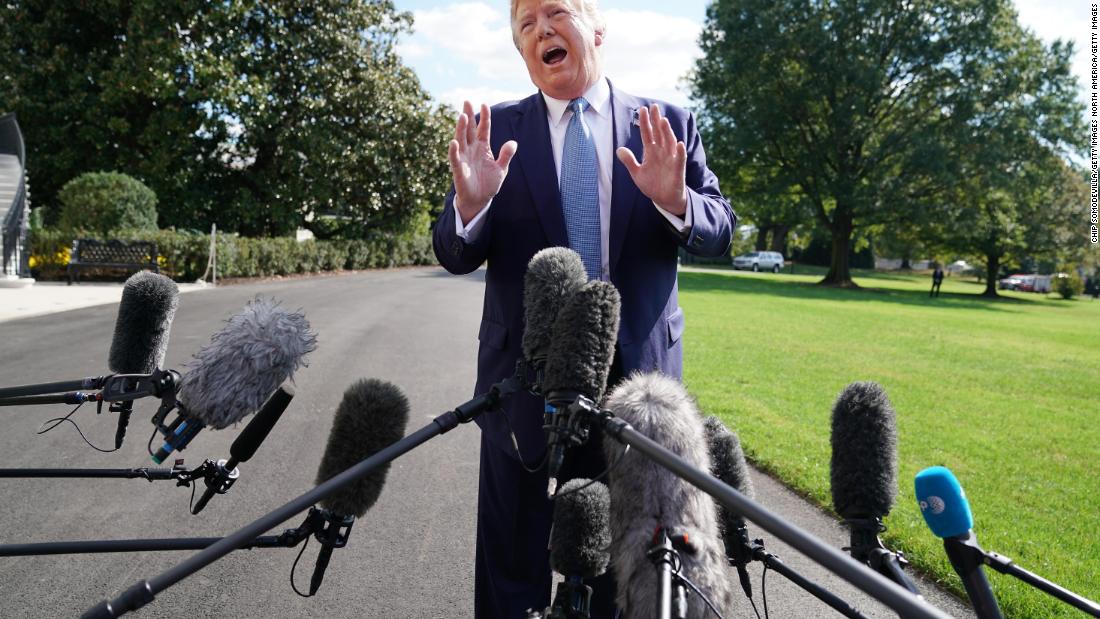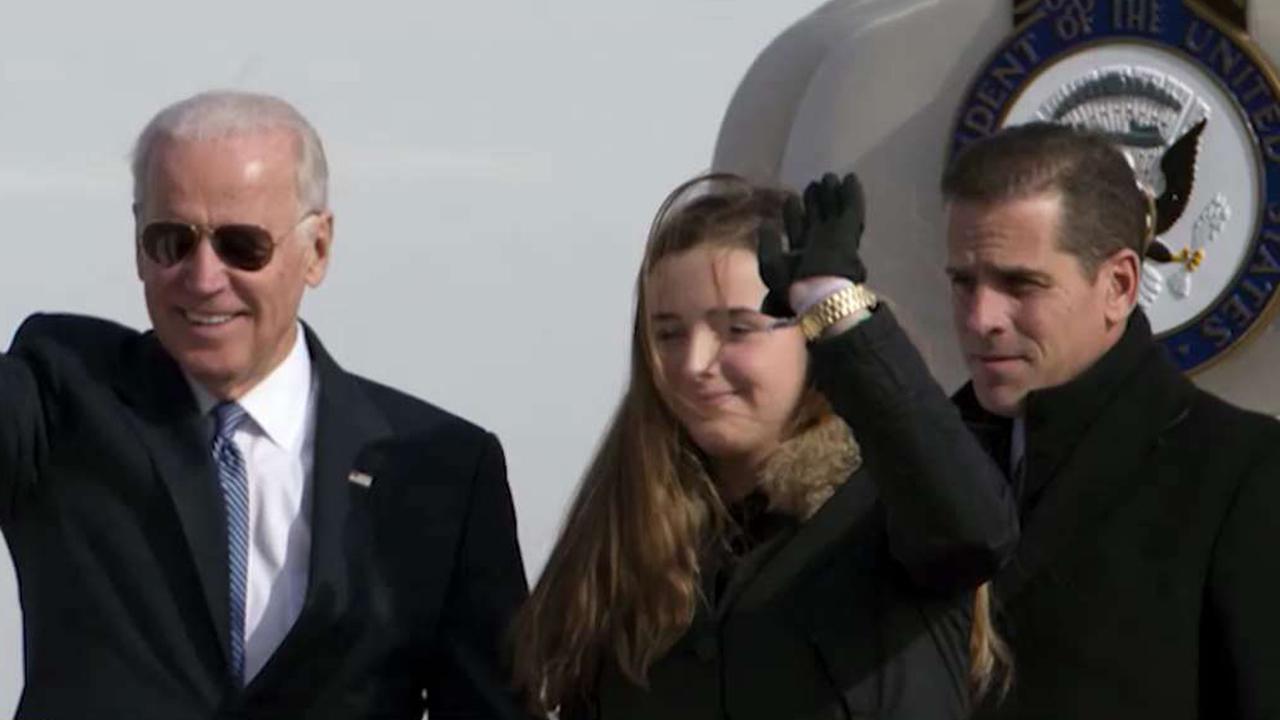
BEIJING — Since a trade war broke out with the United States, China’s state-run media has not held back from commenting on the swirl of political controversies around President Trump. At least, not until now.
After Mr. Trump openly urged China on Thursday to investigate former Vice President Joseph R. Biden Jr. and his son Hunter, Chinese news media and officials were strikingly muted.
While news of Mr. Trump’s request has seeped onto the Chinese internet, official media have been silent so far and social media mentions have been sparse, suggesting censors are at work. As of Saturday, the Chinese Ministry of Foreign Affairs had not publicly responded. Even Global Times, a nationalist Chinese tabloid that is reliably voluble about Mr. Trump, has been quiet.
The lack of response reflects China’s awkward choices as it tries to stand tough against the Trump administration while trying to avoid a spiral of worsening tensions, several experts said.
China’s ties with the Trump administration are volatile. Tit-for-tat tariffs have created a cloud over both economies, and the United States is heading into a presidential election in which China fears it may become a front-burner topic. Relations are especially sensitive at the moment, as top Chinese officials head to Washington in the coming days for the next round of trade talks.
Now Mr. Trump has pushed China into the bonfire of controversies that has prompted Democrats in Congress to initiate an inquiry into his possible impeachment.
“The tag line ‘silence speaks volumes’ is a good one to capture the logic of the likely Chinese response,” said Susan Shirk, who was a deputy assistant secretary of state responsible for China during the Clinton administration and is now chair of the 21st Century China Center at the University of California San Diego.
“Chinese government and media are likely to suppress all discussion in order not to provoke President Trump,” Professor Shirk said by email. China’s leader, Xi Jinping, “is not unusual in working hard to avoid provoking our volatile president and even to try to build some good will with him despite his unpredictability,” she said.
Beijing’s low-key posture may shift in coming days. China is still enjoying its annual National Day holiday, when media and officials are usually slower to respond to news.
The holiday ends after Sunday, and China’s top trade negotiator, Liu He, is expected to travel to Washington for resumed talks starting on Thursday, potentially thrusting him under an unwelcome limelight created by Mr. Trump’s demands for a Chinese inquiry.
Mr. Liu already played an unexpected walk-on role in one of Mr. Trump’s political dramas in February. Mr. Trump chided the United States top trade negotiator, Robert Lighthizer, in front of reporters while Mr. Liu was visiting the Oval Office.
“Undoubtedly, Trump’s request is a very delicate issue for China,” Zhang Jian, a professor at Peking University who teaches about American politics, said in an interview.
“China has its declared stance of not meddling in other countries’ internal affairs, and if it somehow went along with him that would be difficult to explain both at home and abroad.”
Even if China were to look into Hunter Biden’s business dealings, the government would very likely seek to keep any findings to itself, Professor Zhang said. “They’ll want to play this in a very low-key way,” he said.
In Chinese, Mr. Trump’s name is rendered as Te-lang-pu, and on China’s internet he has gained a similar-sounding nickname, Te-mei-pu, a slang phrase meaning “totally unpredictable.” China has experienced Mr. Trump’s changeable ways more than most countries.
As president-elect, Mr. Trump affronted Beijing by holding a telephone call with Tsai Ing-wen, the president of Taiwan, the island-democracy that China claims as its own territory. After he took office, the Chinese government worked energetically to smooth relations. When Mr. Trump visited Beijing in 2017, Mr. Xi courted him in the imperial Forbidden City.
Since then their relations have soured. From last year, the two governments have been locked in disagreement over the Trump administration’s demands that China buy more American goods and pull down protective barriers that foreign businesses say put them at a heavy disadvantage in China. The two sides have been trying to contain the trade tensions, but Mr. Trump has also said that he is in no rush to reach an agreement.
Ties with the United States have also been strained over human rights disputes, including China’s mass detentions of Muslim minorities; accusations of Chinese intelligence operations in the United States; American restrictions on visas for Chinese academics and other visitors, and limits on Chinese companies, especially Huawei; and Chinese anger over the United States’ criticisms of policy in Hong Kong, the semiautonomous city where protesters have raged for months against the city’s Beijing-backed leadership.
China’s calculus in dealing with Mr. Trump has become even more fraught after he demanded that Mr. Xi’s government investigate Mr. Biden, an aspiring Democratic challenger to Mr. Trump in the 2020 presidential election. Mr. Trump already faces a congressional inquiry over his efforts to press Ukraine to investigate the Bidens.
“China should start an investigation into the Bidens, because what happened in China is just about as bad as what happened with Ukraine,” Mr. Trump told reporters. Moments earlier he had commented on the upcoming trade talks with China, and said “if they don’t do what we want, we have tremendous power.”
When asked on Friday if he would be more likely to agree to a trade deal with China if it investigated the Bidens, Mr. Trump said: “One thing has nothing to do with the other.”
Mr. Trump’s demand for an investigation appears to focus on a business venture that involved Mr. Biden’s son, Hunter, and Chinese state-owned financial companies. Mr. Trump suggested that China had channeled $1.5 billion to Hunter Biden in an effort to influence his father.
But the allegation seems to find little, if any, support in the established facts. Mr. Biden and other Democratic contenders for the presidency have denounced Mr. Trump’s comments.
Chinese media have widely reported that Mr. Trump pressed Ukraine to investigate the Bidens, making the silence over his similar call to China more jarring. Before Mr. Trump made his comments pressing China to investigate, the Chinese foreign minister, Wang Yi, had already said his government did not want to become mired in American political strife.
“We’ve never meddled in American domestic affairs, and are confident that the American people can solve their own problems,” Mr. Wang said in a speech in New York in late September, according to Xinhua, the official Chinese news agency. (On Friday, Global Times used its Twitter feed to cite similar words from Mr. Wang, but there was no evidence that he used them after Mr. Trump called for an investigation.)
Beijing has reason to worry that its policies could become a focus for candidates in the coming presidential election, said Bonnie S. Glaser, the director of the China Power Project at the Center for Strategic and International Studies.
American public opinion about China has turned sharply negative, according to findings recently published by the Pew Research Center. The latest opinion survey conducted in spring this year found that 60 percent of American respondents had an unfavorable opinion of China. That was the highest unfavorable level in 15 years of Pew polling of American views of China, and a 13-percentage-point jump in negative opinion compared with views last year.
Mr. Biden has vowed to get tough on China, while also criticizing Mr. Trump’s tariffs on goods made in China as damaging to the American economy and consumers. Other Democratic contenders for the presidential nomination, including Senator Elizabeth Warren, have been more bluntly critical of China’s policies.
“I do think China will be a focus of discussion and debate,” Ms. Glaser said. “Candidates may vie for who can advocate the toughest policy responses.”
https://www.nytimes.com/2019/10/05/world/asia/trump-china-biden.html
2019-10-05 08:53:00Z
52780399935508







